Key takeaways
- The Affordable Care Act (ACA) significantly increased healthcare access, particularly for those with pre-existing conditions, ensuring fairer coverage for millions.
- Medicaid expansion reduced health disparities in underserved communities, illustrating the real-world impact of healthcare reform.
- Key challenges included political opposition, implementation complexities, and ongoing affordability issues, emphasizing the intricacies of healthcare reform.
- Community support and grassroots efforts were vital in navigating ACA complexities, highlighting the importance of clear communication and persistent advocacy for health reforms.
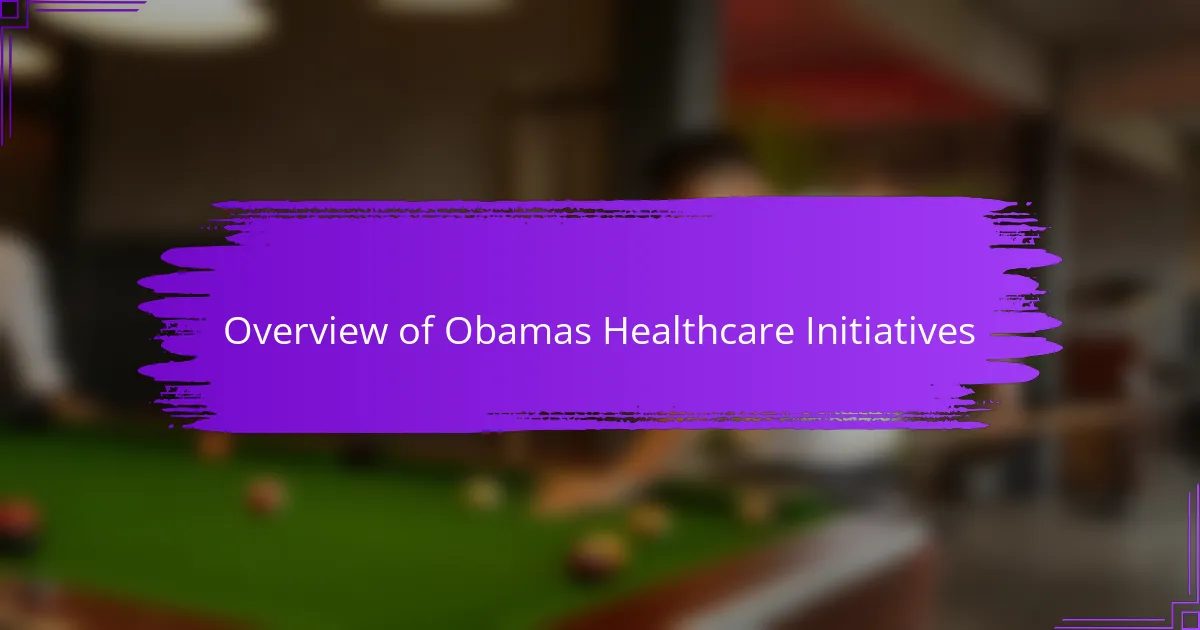
Overview of Obamas Healthcare Initiatives
When I think about Obama’s healthcare initiatives, the Affordable Care Act (ACA) immediately comes to mind. It was a game-changer—for many, including my own family, who suddenly had access to healthcare coverage that felt more reliable and affordable. Have you ever wondered how such a broad policy could impact everyday lives? For me, it’s not just the policy itself but the sense of security it brought.
What stands out is how the ACA aimed to address long-standing issues like pre-existing conditions and the high cost of insurance. I remember reading stories of people denied coverage before these reforms, and it honestly feels like a step toward fairness. It’s more than legislation—it’s about human dignity and health access that too often was out of reach.
Then there’s the expansion of Medicaid, which often goes unnoticed but had profound effects on millions. I think about communities that finally saw a reduction in health disparities because of this. It’s easy to argue over policies, but when you hear real experiences, you realize how tangible these changes were—and still are.
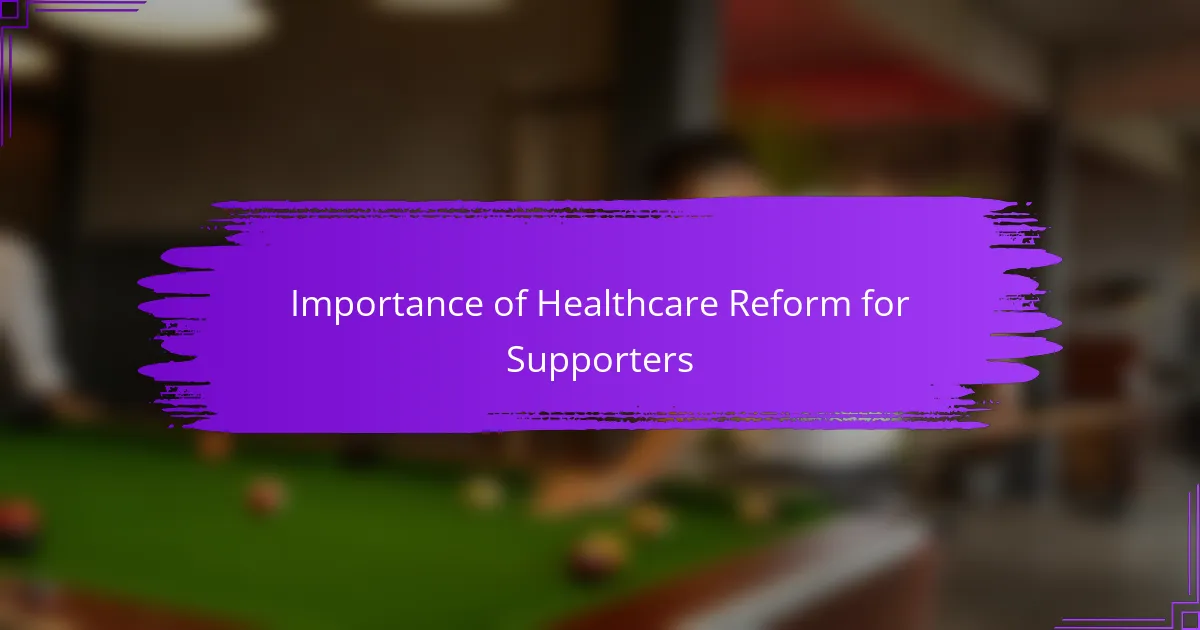
Importance of Healthcare Reform for Supporters
For many of us supporters, healthcare reform isn’t just a political issue—it’s deeply personal. I often ask myself how different life would be without those protections that the ACA provided, especially for loved ones facing health challenges. Knowing that people no longer have to fear being denied coverage because of their health history brings a sense of relief that’s hard to overstate.
I’ve seen firsthand how healthcare reform changes the way communities approach their health, creating opportunities for prevention and early treatment that weren’t there before. When I talk with others in the Obama supporter community, the common thread is a feeling of hope—that healthcare is a right, not a privilege. It’s that hope that drives our continued support and belief in the need for reform.
What strikes me most is how reform empowers individuals and families to take control of their well-being without the constant worry of financial ruin. Isn’t that what healthcare should truly provide? From my perspective, the importance of these initiatives lies in restoring dignity and security to millions—a goal every supporter can stand behind.

Key Benefits of Obamas Healthcare Plans
One of the key benefits I appreciate most about Obama’s healthcare plans is how they finally made coverage accessible to people with pre-existing conditions. I can’t stress enough how life-changing that is—no one should have to choose between managing their health and risking financial disaster. Have you noticed how this simple protection alone shifted the entire conversation around health insurance fairness?
Another benefit that resonates deeply with me is the expansion of Medicaid. In my experience, this wasn’t just a policy tweak; it was a lifeline for families in underserved communities. I recall hearing from friends in rural areas who gained access to essential medical services for the first time. It’s the kind of change that often flies under the radar but transforms daily life.
Lastly, I’ve seen firsthand how the ACA encouraged preventive care by covering screenings and vaccinations. This proactive approach struck me as a smarter way to manage health—catching issues early instead of waiting for emergencies. Don’t we all want a system that supports us staying healthy, not just treating us when things go wrong? For me, this shift toward prevention truly embodies the spirit of the reforms.

Challenges Faced by the Initiatives
It’s clear to me that one of the biggest hurdles Obama’s healthcare initiatives faced was fierce political opposition. I remember how every attempt to expand coverage was met with intense debates that sometimes felt less about policy and more about partisanship. Have you ever wondered how difficult it is to push through reforms when the very idea of change sparks such division?
Another challenge that caught my attention was the complexity of implementing the ACA on such a massive scale. I think about the initial website glitches and enrollment confusion—it wasn’t just a technical issue, but a setback that affected real people trying to get insured. It made me realize how delicate and complicated healthcare reform really is, especially when millions depend on it.
Lastly, affordability remained a tough nut to crack. Even as coverage expanded, many still struggled with premiums and out-of-pocket costs. From talking with friends and family, I see the frustration when access doesn’t quite match affordability, raising the question: how do you balance good coverage with realistic costs? This challenge felt like a reminder that no reform is perfect, but striving for better is what matters most.
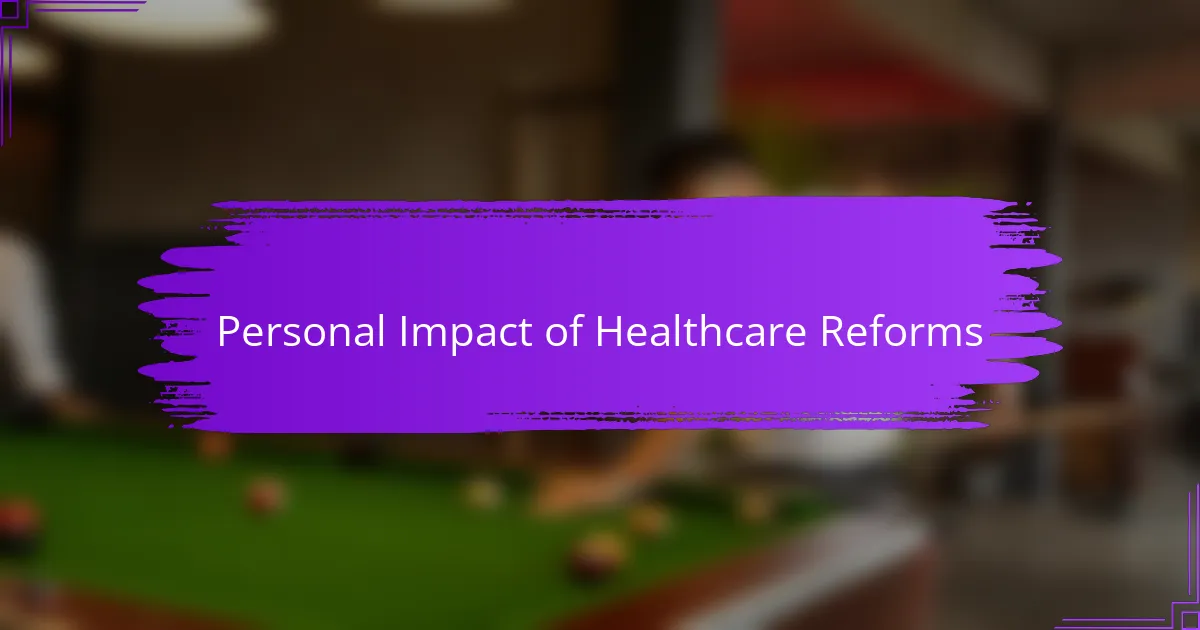
Personal Impact of Healthcare Reforms
When I reflect on how these healthcare reforms touched my own life, I think about the peace of mind they brought during some challenging times. Having coverage that didn’t vanish when a health scare happened made all the difference—I could focus on recovery rather than drowning in medical bills. Have you ever experienced that relief, knowing you’re not alone in facing health challenges?
One moment that stays with me is when a family member who once struggled with coverage finally accessed the care they needed without jumping through endless hoops. It was a reminder that these policies aren’t just lines of text; they translate into real support and healing. It’s that kind of tangible impact that fuels my belief in the necessity of such reforms.
I sometimes wonder how different my outlook would be without these protections. Would the constant anxiety over insurance gaps have weighed heavier? From my experience, the reforms didn’t just change access—they changed how we feel about health, safety, and the future. That shift in mindset makes all the work behind these initiatives worthwhile.
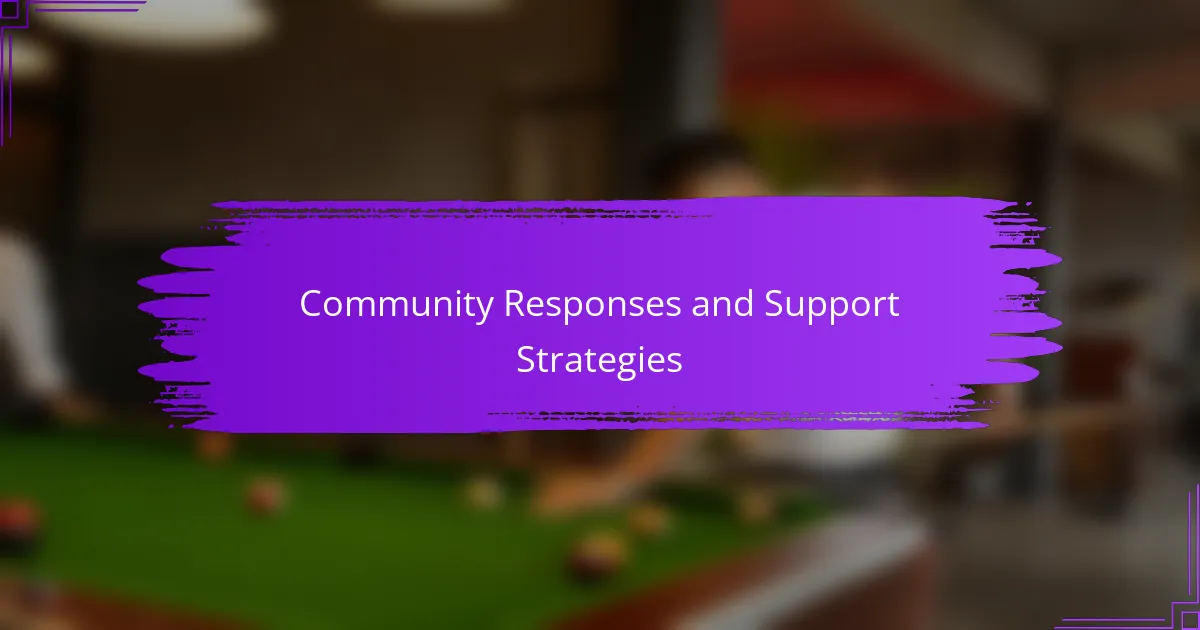
Community Responses and Support Strategies
I’ve noticed how our community often rallies around sharing success stories—those moments when someone finally gets coverage after years of struggle. It feels like more than just support; it’s a collective celebration of progress. Have you ever felt that powerful sense of belonging when people come together over a shared cause?
What strikes me is how many grassroots groups emerged to help navigate the ACA’s complexities, guiding newcomers through enrollment and insurance choices. From what I’ve seen, this hands-on assistance makes a world of difference, turning policy into practical help. Isn’t that what real community support should look like—accessible, patient, and empathetic?
Sometimes, I reflect on how encouragement from peers in the Obama supporter community helped me stay optimistic during political setbacks. That continuous exchange of hope and information is like a steady heartbeat, reminding me that change takes time but is possible. Wouldn’t you agree that having that kind of network is crucial when facing uphill battles?
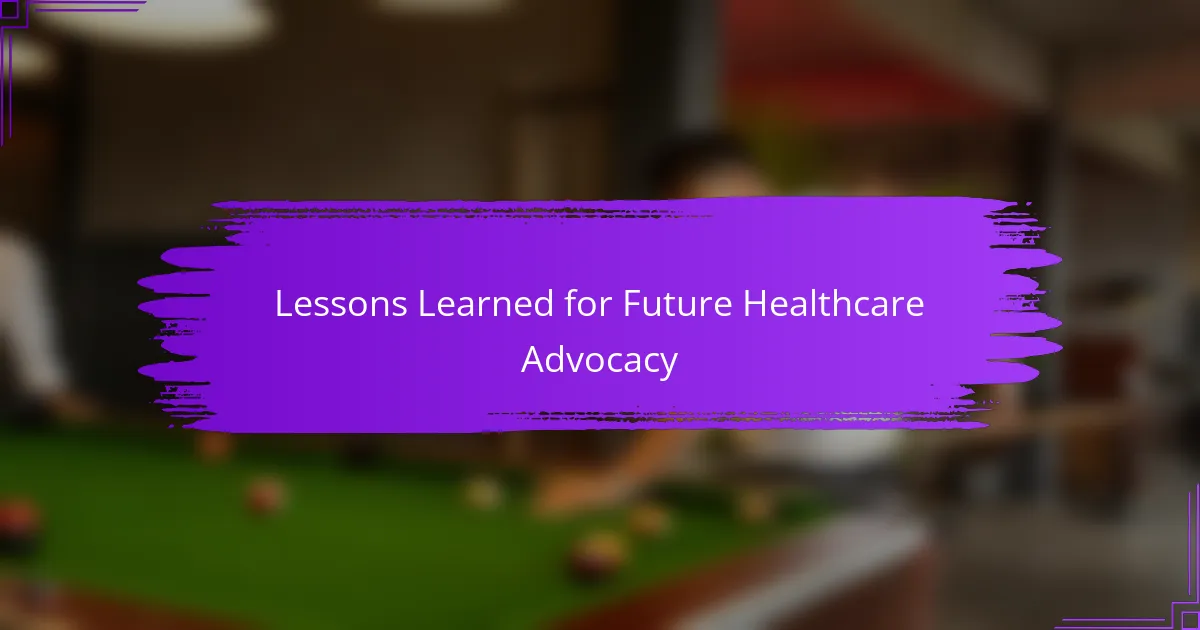
Lessons Learned for Future Healthcare Advocacy
Looking back, one lesson I find crucial is the power of clear, compassionate communication in healthcare advocacy. I’ve seen how confusion around enrollment or policy details can discourage people who desperately need coverage. Don’t you think that breaking down complex information into simple, relatable language could make future efforts more effective?
Another takeaway for me is the importance of persistence amid opposition. Advocacy isn’t a sprint; it’s a marathon that requires staying committed even when faced with political roadblocks. From my experience, keeping the focus on real stories and human impact helps maintain momentum—it reminds us why these battles are worth fighting.
Finally, I’ve come to appreciate how building diverse coalitions strengthens advocacy efforts. When I’ve worked with others—from healthcare workers to community leaders—the collective voice became harder to ignore. Isn’t it inspiring how unity around a common cause can drive meaningful change, even against daunting odds?


